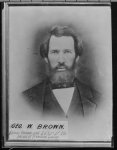I hope you all enjoyed your holiday, Gentle Readers. Rather than write history, I spent mine putting together Lego and playing Final Fantasy XIV with a friend. I intended to write after the Lego, but the game consumed the remainder of the productive portion of the day. I have no regrets.
That said, the nineteenth century hasn’t gone away. We left George Washington Brown telling the world the state of affairs in Kansas. Proslavery judge Samuel Lecompte had gotten a grand jury to summon the free state government leadership on grounds of treason. Charles Robinson, the governor, and Andrew Reeder, delegate to Congress and senator-elect, made a run for it. Robinson traveled openly and got caught at Lexington, Missouri. Reeder disguised himself and skulked about at night. He got clear of Missouri, though not without a few close calls and much delay. Brown informed his readers that, whatever happened with the antislavery leadership, ordinary Kansans remained in peril. The territorial government still stood against them, to the point of outlawing their platform. Beyond that, antislavery Kansans faced the threat of individual or mob violence for expressing their opposition to slavery in their territory.
From the general, Brown proceeded to the specific:
The hue and cry is now raised against Gov. Robinson and Senator Reeder. “Kill them! kill them!” is in the throats of every brawler who goes unhung in Kansas. Their movements are watched-their goings out and comings in carefully noted-and they are forced to seek a place of safety in the Free States.
Most of us probably read “hue and cry” as a stock phrase, but it originates in a literal call to apprehend wrongdoers. Brown has Robinson and Reeder’s situation dead to rights: orders existed for their arrest and posses had assembled to take them. If they should die while resisting, or “resisting” arrest, the proslavery party might well experience such remorse as to leave them hung over for a week. Both men feared their death if taken. Reeder fled Kansas, rather than stay behind as a test case, specifically because he had information that he would never live long enough to face trial.
Brown, like the free state leadership, saw the situation as dire. They had taken pains to avoid initiating major violence and, some hotheads aside, feared the results of an armed class of any scale. Proslavery and antislavery Kansans did kill one another over politics, but heretofore the murders happened on a personal scale or between small bands of men. Even a frontier government might contain that sort of thing without undue strain. But now, the free state men feared,
no earthly power can prevent a bloody collision. If it must come, the sooner we have whipped our enemies, the sooner will quiet be restored to the country. Human patience cannot long endure this system of terrorism and persecution. If we can secure quietude in no other way than by fighting for it, surely ’twere infinitely better that we pass through a sanguinary struggle than be made slaves!
Brown could have written all of that on almost any occasion; he had feared for his own life before. But until the grand jury acted, the official reaction to the free state movement had come to little more than rhetorical condemnation and largely unenforced laws. The violence they faced had come irregularly, in response to specific circumstances. While that had come under the color of law when a proslavery army invested Lawrence back in December, the town narrowly avoided destruction. No campaign had grown from that proslavery defeat; the Missourians went home on the instructions of their own leaders. Now a force within Kansas and with the power of the territorial government and its federal imprimatur had moved against them, a force which might call on the United States Army to destroy their movement.

You must be logged in to post a comment.